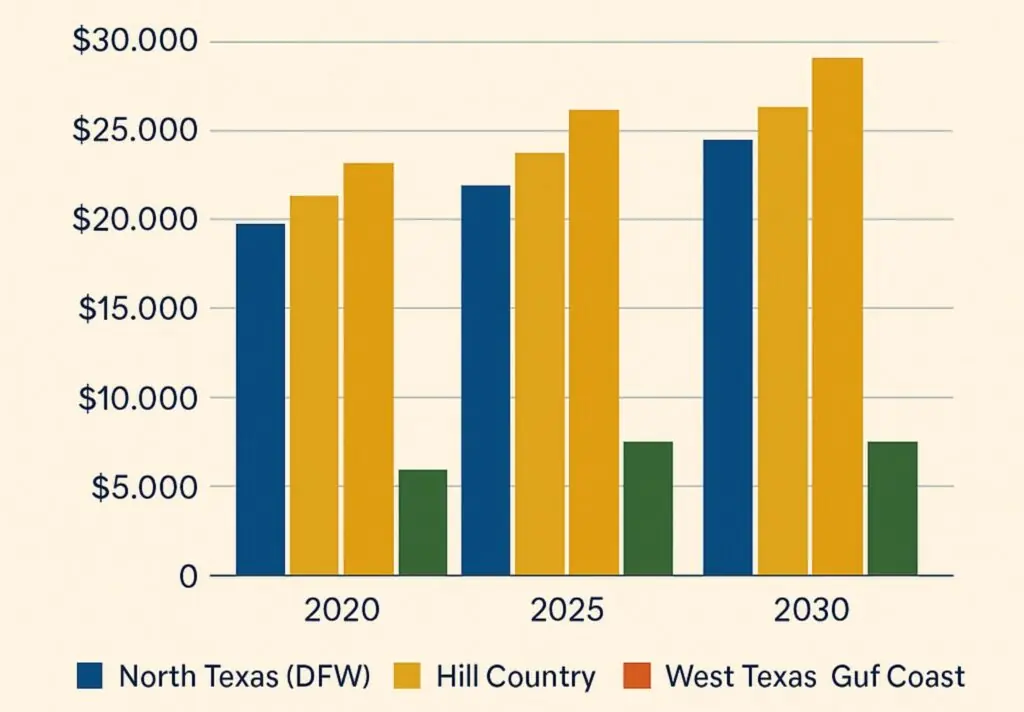The Texas land market continues to stand out as one of the most dynamic in the “Land of America.” Even in an era of rising interest rates and economic uncertainty, demand for land in Texas remains resilient. Fueled by population growth, corporate relocations, and a strong agricultural and energy base, the Lone Star State’s land sector has not only weathered national slowdowns — it has outperformed most of the country.
In 2025, buyers are increasingly looking beyond urban centers, favoring rural and suburban plots that offer more space, flexibility, and long-term value. This shift is particularly evident in areas like Hill Country, West Texas, and the Gulf Coast, where demand is driving steady appreciation.

Key Economic Drivers Influencing Texas Land Values
Population Growth and Migration Patterns
Texas remains the top destination for domestic migration in the U.S., attracting over 400,000 new residents annually. Many come from high-cost states like California and New York, seeking affordable land, lower taxes, and better quality of life.
Corporate Relocations and Job Creation
Major corporations such as Tesla, Oracle, and Hewlett Packard Enterprise have relocated or expanded in Texas, bringing thousands of high-paying jobs. This has fueled housing demand and increased the value of nearby land.
Agricultural and Energy Sector Impact
Texas leads the nation in cattle production, cotton exports, and wind energy generation. These industries maintain strong demand for agricultural land, while oil and gas exploration keeps certain West Texas markets attractive for mineral rights investors.
Regional Land Trends Across Texas
North Texas and the DFW Growth Corridor
Land in the Dallas–Fort Worth metroplex and surrounding counties continues to command premium prices, averaging $18,000 per acre in 2025, with projections reaching $24,000 by 2030. Rapid population growth and infrastructure expansion are key drivers.
Hill Country Lifestyle Demand
Hill Country’s scenic views and booming wine industry make it one of the most sought-after regions. Prices have grown from $15,000 per acre in 2020 to $21,000 in 2025, with a projected 2030 value of $28,000.
West Texas Affordability
While more remote, West Texas offers some of the most affordable land in the state, averaging just $5,000 per acre in 2025. This region appeals to large-scale ranchers and budget-conscious investors.
Gulf Coast and Coastal Bend Appeal
Coastal properties have surged in value due to tourism and retirement migration. Prices average $14,500 per acre in 2025, with a projection of $19,000 by 2030.
Texas Land Price Trends
The following table and chart summarize recent and projected Texas land prices across major regions:
| Region | 2020 Price per Acre ($) | 2025 Price per Acre ($) | Projected 2030 Price per Acre ($) |
|---|---|---|---|
| North Texas (DFW) | 12,000 | 18,000 | 24,000 |
| Hill Country | 15,000 | 21,000 | 28,000 |
| West Texas | 3,500 | 5,000 | 7,000 |
| Gulf Coast | 10,000 | 14,500 | 19,000 |
The chart clearly shows steady upward momentum, with Hill Country and North Texas leading in price growth, while West Texas remains the most affordable entry point.
Buyer Segments and Their Impact on the Market
Residential Buyers and Homesteaders
Increased interest from remote workers has pushed demand for rural and semi-rural land where buyers can build custom homes or start small farms.
Agricultural Buyers and Ranchers
Cattle ranching and crop farming still dominate rural economies, with many buyers seeking large tracts for both commercial and family use.
Investors and Developers
Developers target suburban fringes, while investors focus on undervalued land with long-term appreciation potential.
Challenges and Risks in the Texas Land Market
Infrastructure Limitations in Rural Areas
While affordable, many rural properties lack paved road access, utilities, or broadband, requiring extra investment before development.
Zoning and Development Restrictions
Counties vary widely in zoning laws, which can limit building options for buyers unfamiliar with local regulations.
Climate and Water Availability Concerns
Drought risk in certain regions, especially West Texas, can impact agricultural potential and long-term land value.
Investment Outlook for Texas Land
Short-Term Opportunities
West Texas and select Gulf Coast counties remain undervalued compared to their growth potential. Investors can secure acreage at low prices today with expectations of steady returns.
Long-Term Appreciation Potential
Historical trends suggest Texas land values will continue rising over the next decade, particularly in high-growth corridors like North Texas and Hill Country.
Texas in the Land of America Market
Among all states in the Land of America network, Texas consistently ranks in the top three for land sales volume, appreciation rates, and diversity of offerings.
Texas remains a powerhouse in the Land of America market. Whether you’re a homebuilder, rancher, or investor, the state offers a unique blend of affordability, economic opportunity, and appreciation potential. With strategic selection and awareness of local market conditions, 2025 could be the ideal time to secure your stake in the Lone Star State. Consult our office for your land investments.